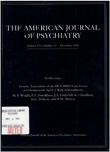Prognostic effect of the variable course of alcoholism on the 10-year course of depression
Abstract
OBJECTIVE: The purpose of this study was to examine the predictive effect of the clinical activity of patients' alcohol use on the course of major depressive disorder. METHOD: One hundred seventy-six probands with Research Diagnostic Criteria (RDC) diagnoses of both major depressive disorder and alcoholism were compared to 412 probands with major depressive disorder only by using 10 years of short-interval, prospective follow-up data collected as part of the National Institute of Mental Health Collaborative Depression Study. The course of depression was examined by using intensity analysis to represent transitions between states of major depressive disorder. The effect of patients' RDC alcoholism status on the long-term course of major depressive disorder was examined by stratifying the analyses by three levels of alcoholism--never alcoholic, not meeting criteria for current alcoholism, and current alcoholism. RESULTS: Depressed probands who were either never alcoholic or currently nonactive alcoholic had twice the likelihood of recovery from major depressive disorder than did actively alcoholic depressed probands. The three levels of alcoholism did not differentially predict recurrence of major depressive disorder. CONCLUSIONS: These findings provide long-term, empirically derived evidence for the deleterious effect of current alcoholism on recovery from depression. The lack of a differential effect of the three levels of alcoholism on recurrence of major depressive disorder suggests that other factors may have greater predictive value.
Access content
To read the fulltext, please use one of the options below to sign in or purchase access.- Personal login
- Institutional Login
- Sign in via OpenAthens
- Register for access
-
Please login/register if you wish to pair your device and check access availability.
Not a subscriber?
PsychiatryOnline subscription options offer access to the DSM-5 library, books, journals, CME, and patient resources. This all-in-one virtual library provides psychiatrists and mental health professionals with key resources for diagnosis, treatment, research, and professional development.
Need more help? PsychiatryOnline Customer Service may be reached by emailing [email protected] or by calling 800-368-5777 (in the U.S.) or 703-907-7322 (outside the U.S.).



